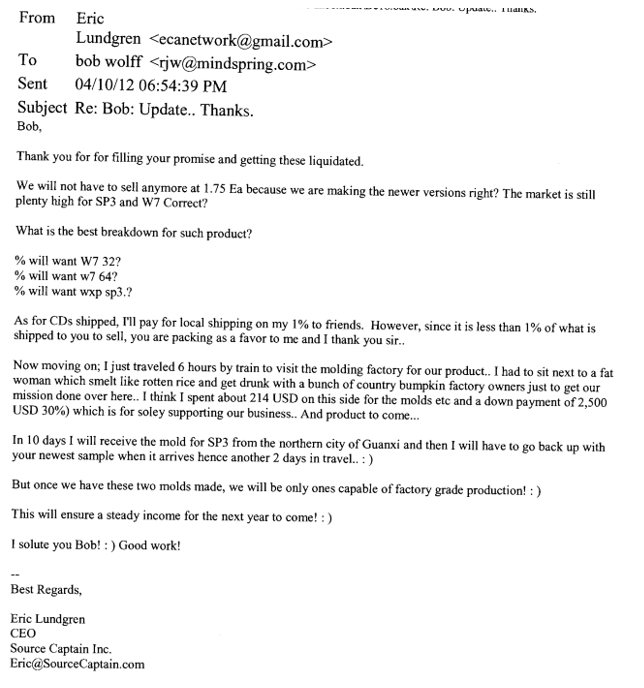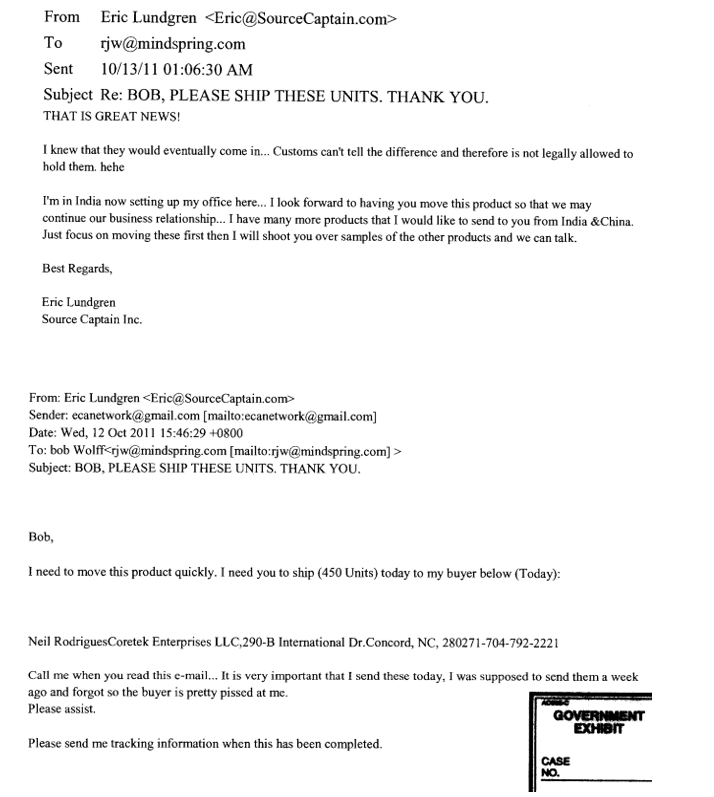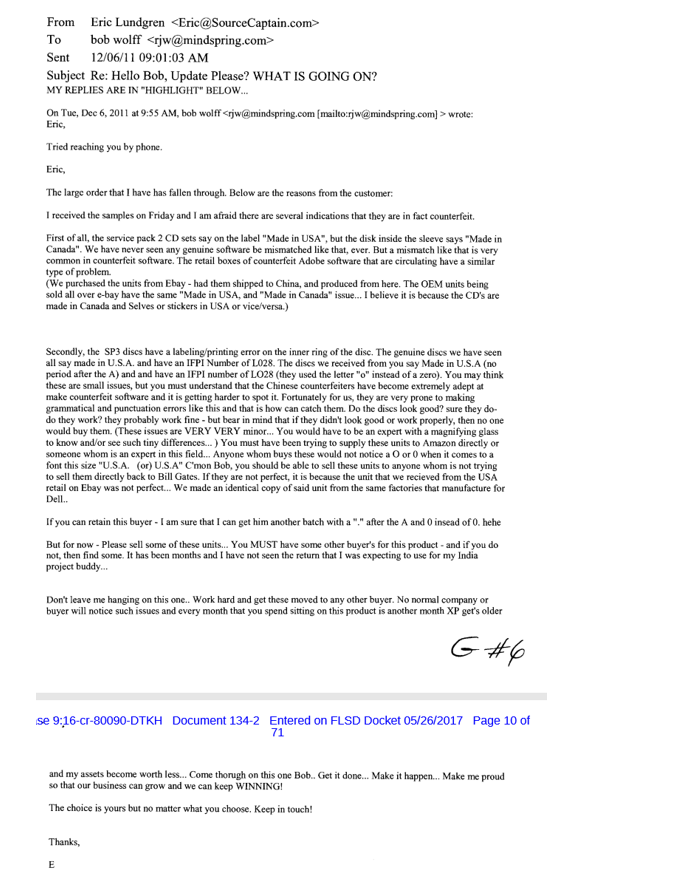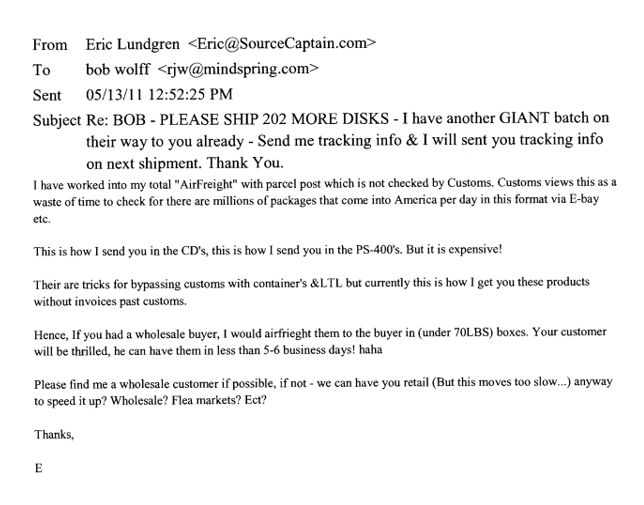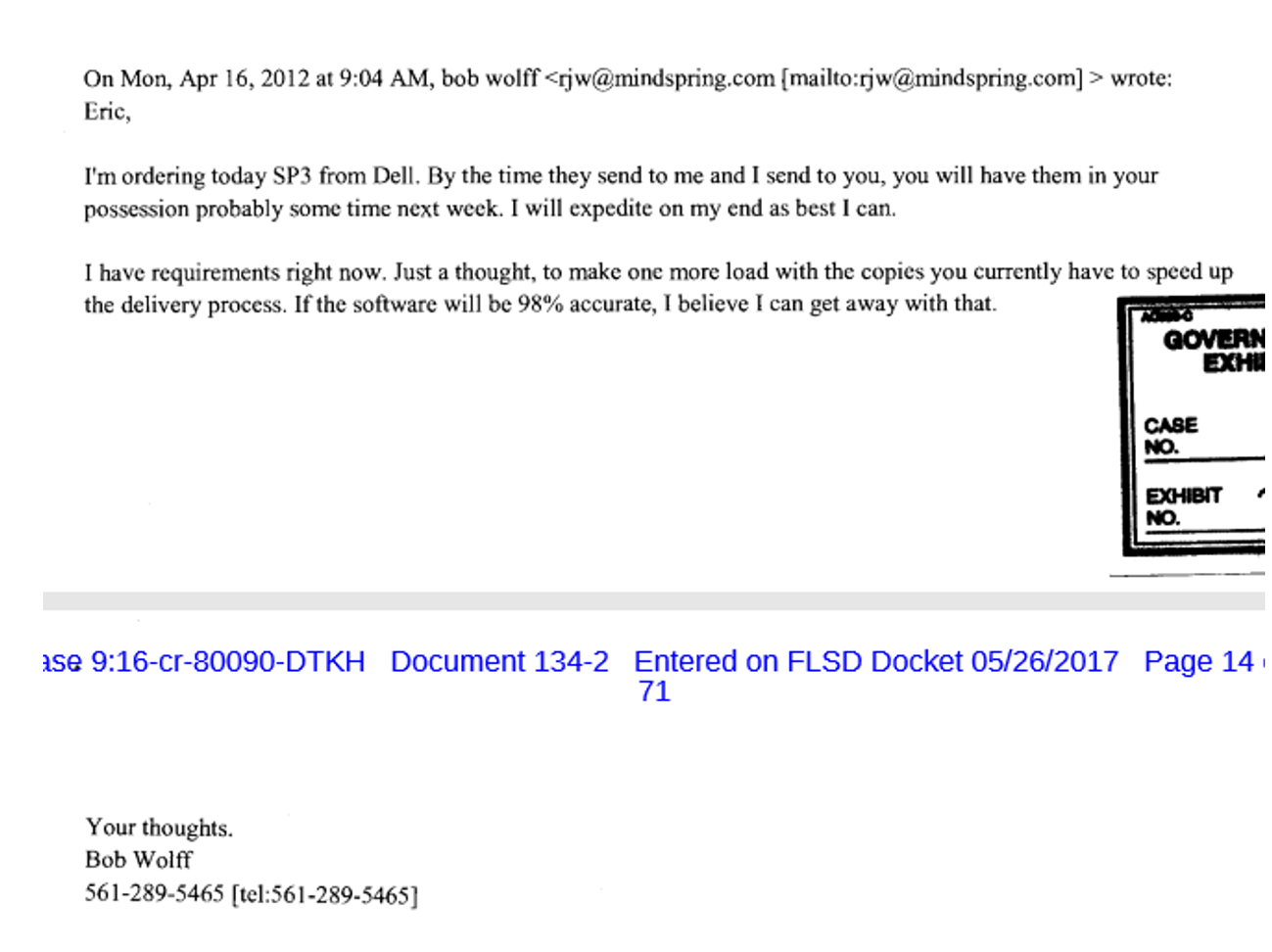In the last few days there have been several stories about the sentencing of Eric Lundgren in a case that began in 2012, and we have received a number of questions about this case and our role in it. Although the case was not one that we brought, the questions raised recently have caused us to carefully review the publicly available court documents. All of the information we are sharing in this blog is drawn from those documents. We are sharing this information now and responding publicly because we believe both Microsoft’s role in the case and the facts themselves are being misrepresented.
But to start, it’s important to state our principles:
- We fully support refurbishing and recycling of computers and have robust programs to support this. There are many individuals and companies who do great work here. We have programs that support refurbishers. Altogether these programs have more than 3,000 members, recycling millions of PCs.
- While we’ve cut back substantially on the number and types of piracy cases that we bring, we remain committed to protecting our customers when we see others working to deceive them – especially when they’re acting unlawfully. We often pursue actions, for example, against phone scammers who masquerade as technical support to trick and defraud customers. We similarly remain concerned when counterfeiters seek to deceive consumers, even more so when they’re seeking to profit from this activity.
With this as context, here are some facts of the case worth noting – all of which are spelled out in detail in the court documents.
- Microsoft did not bring this case: U.S. Customs referred the case to federal prosecutors after intercepting shipments of counterfeit software imported from China by Mr. Lundgren.
- Lundgren established an elaborate counterfeit supply chain in China: Mr. Lundgren traveled extensively in China to set up a production line and designed counterfeit molds for Microsoft software in order to unlawfully manufacture counterfeit discs in significant volumes.
- Lundgren failed to stop after being warned: Mr. Lundgren was even warned by a customs seizure notice that his conduct was illegal and given the opportunity to stop before he was prosecuted.
- Lundgren pleaded guilty: The counterfeit discs obtained by Mr. Lundgren were sold to refurbishers in the United States for his personal profit and Mr. Lundgren and his codefendant both pleaded guilty to federal felony crimes.
- Lundgren went to great lengths to mislead people: His own emails submitted as evidence in the case show the lengths to which Mr. Lundgren went in an attempt to make his counterfeit software look like genuine software. They also show him directing his co-defendant to find less discerning customers who would be more easily deceived if people objected to the counterfeits.
- Lundgren intended to profit from his actions: His own emails submitted as evidence before the court make clear that Mr. Lundgren’s motivation was to sell counterfeit software to generate income for himself.
- Microsoft has a strong program to support legitimate refurbishers and recyclers: Our program supports hundreds of legitimate recyclers, while protecting customers.
For those who want more detail on specific aspects of the case, I’ve included additional details drawn from emails sent and received by Mr. Lundgren. These emails were included in the evidence that the government filed with the court. For those interested in reading the filings themselves we have republished them so that they are easier to find and read:
Government evidence, including emails sent and received by Mr. Lundgren.
Government filing with the U.S. Court of Appeals
Microsoft did not bring the case
Microsoft did not bring the case against Mr. Lundgren. It began in 2012 when U.S. Customs intercepted shipments of counterfeit CDs that Mr. Lundgren was sending to his co-defendant in the United States. Customs warned the parties about the issue, but the shipments continued.
In total, between June 2011 and November 2013, Mr. Lundgren caused counterfeit discs to be shipped to his co-defendant, directly or indirectly, in the United States. Lundgren received $92,000 in wire transfers and PayPal payments for the counterfeits from his co-defendant.
Customs authorities referred the case to federal prosecutors. The United States Attorney’s Office in Miami pressed charges and Mr. Lundgren pleaded guilty. Microsoft was called as an expert witness toward the end of the legal proceedings. Sentencing guidelines for Mr. Lundgren were calculated at 37 to 46 months, according to federal sentencing rules, and the judge in this case issued a below-guidelines sentence of 15 months. Mr. Lundgren’s sentence was issued by a U.S. District Court and upheld by the U.S. Court of Appeals.
Mr. Lundgren set up a large counterfeit operation in China and intended to profit from his actions
Mr. Lundgren often claimed in his defense that his goal was to help the e-recycling community. However, publicly available evidence in the case shows that he intended to profit from and disadvantage legitimate members of that community by selling them counterfeit CDs.
In one email sent to his co-defendant in April 2012, he talked about taking a six-hour train trip in China to meet with suppliers and arrange manufacturing of the discs:
“Once we have these two molds made, we will be the only ones capable of factory grade production! :)”
And that,
“This will ensure a steady income for the next year to come! :)”
In another email to his co-defendant, he said,
“I look forward to having more product so that we can continue our business relationship. I have many more products I would like to send you from India & China. Just focus on moving these first then I will shoot you over samples of other products and we can talk.”
In a number of different emails, Mr. Lundgren and his co-defendant repeatedly talk about “buyers,” “moving product” and raise questions about revenue. In a different 2011 email exchange with his co-defendant, Mr. Lundgren said,
“I need you to ship (450 units) to my buyer below (Today).” He added, “I was supposed to send them a week ago and forgot so the buyer is pretty pissed.”
Evidence submitted to the court shows that one transaction alone generated $28,000 in revenue for Mr. Lundgren and his co-defendant from the sale of 8,000 counterfeit software discs.
The government’s brief in the case also make clear that during their investigation, Mr. Lundgren’s co-defendant:
“admitted to law enforcement that Lundgren knew he was selling the Reinstallation Discs as authentic to his customers.”
Mr. Lundgren went to great lengths to mislead people:
Part of Mr. Lundgren’s defense also involved claims that he was trying to provide the community with something that was freely available anyway. This claim was rejected by the district court and the Court of Appeals. This is because Microsoft itself sells genuine versions of these CDs to refurbishers (hence the market for selling counterfeit copies). In addition, Mr. Lundgren took great pains to disguise the counterfeit software he imported, including arranging for fake Microsoft and Dell labels to be applied to the discs.
In an email sent in December of 2011, Mr. Lundgren said to his co-defendant,
“You would have to be an expert with a magnifying glass to know and/or see such differences.” “You must have been trying to supply these units to Amazon directly or someone who is expert.”
He went on to say,
“C’mon Bob, you should be able to sell these units to anyone whom is not trying to sell them back to Bill Gates.”
And,
“Please sell some of these units. You MUST have some other buyers for this product – and if you do not, then find some. It has been months and I have not seen the return I was expecting to use for my India project buddy.”
He concluded,
“No normal company or buyer will notice such issues.” “Make me proud so that our business can grow and we can keep winning.”
Mr. Lundgren also tried to evade U.S. Customs and coached his codefendant how to handle questions from federal agents. In 2011 he wrote:
“There are tricks for bypassing customs with container’s & LTL but currently this is how I get these products without invoices past customs.”
And, referring to customs officers:
“If they call you just play stupid and tell them you ordered from an asset management broker overseas.”
Mr. Lundgren and co-defendant Bob Wolff explicitly discussed deceiving people with the counterfeit software. In one email to Mr. Lundgren about the software he’s arranging to manufacture, Mr. Wolff writes:
“If the software will be 98% accurate I believe I can get away with that.”
About the case:
This case involves our program to partner with businesses that refurbish PCs. These businesses typically purchase used PCs, wipe them clean of all software, install a fresh version of Windows and sell the refurbished PCs with new software to new customers. When a refurbisher installs a fresh version of Windows on a refurbished PC, we charge a discounted rate of $25 for the software and a new license – it is not free. Thousands of refurbishers participate in this program legally without confusion, and the program works.
Mr. Lundgren’s scheme was simple. He was counterfeiting Windows software in China and importing it to the United States. Mr. Lundgren intended the software to be sold to the refurbisher community as if it was a legitimate, licensed copy of Windows. It was not. The evidence in the case shows Mr. Lundgren used his knowledge of the PC recycling community to scam the very community he claimed to champion and to evade the law. Had he simply wanted to help this community, why did he set up an entire counterfeit production operation in China to make the CDs appear legitimate? And why did he charge for his counterfeit product and try to make a profit at the expense of the community he was ostensibly trying to help?
All of the emails shown below are contained in the publicly available court documents. We link to those documents above but have excerpted some here.

